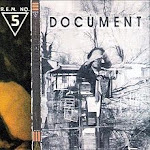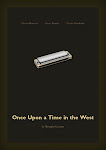
OK Computer is the third studio album from British band Radiohead and, while the majority of the music is still guitar dominated, it marks a progression to a more expansive sound drawing on a wider range of influences than their previous albums, setting it apart from the majority of Britpop and alternative rock sounds at the time.
The album not only indicates a progression of the band’s musical style, but lyrically as well. When writing the first two albums it seems the band were content on using introspective soul-searching as their main reference point, however on OK Computer the cryptic lyrics address much bigger, salient issues about life in the 1990s. Let Down with its soothing, arpeggiated guitar melody deals with transport and being in transit, but not in control, passing the world by ‘crushed like a bug in the ground’, with the electric piano at the end highlighting the band’s desire to experiment with other instruments, and succeeding. Subterranean Homesick Alien, which also makes use of the electric piano, tells the story of an isolated narrator who longs to be abducted by extraterrestrials to see ‘the world as I’d love to see it’ , showing the band identifying with the social disconnection of the common majority in the 1990s and the malaise they felt.
OK Computer is an ambitious album which sees the band tackle big ideas with a style that was very different from the majority of music being produced at the time and, while the first half of the album is a masterpiece of song-writing and composition, after Thom Yorke’s computerised voice stating what he saw as slogans of the 90s in Fitter Happier, the album does take a dip. Although, in typical Radiohead style all of the songs are well-formed and well-written, they just don’t live up to the first half of the album or indeed the band’s previous album The Bends. Electioneering, despite its catchy riff, would not be out of place on the band’s distinctly average debut Pablo Honey, and songs like No Surprises just seem too light and simple after listening to the astounding first half.
Despite some weak points there is no doubt in my mind that Radiohead’s third album while it maybe not their best, is definitely their most important. The band refused to retread successful formulas which the majority of bands in Britain were doing at the time. After showing signs of it on The Bends in the songs like Planet Telex, on OK Computer the band took up ground that no-one was claiming and made a record that was completely new and different to what was being made by their contemporaries. Their daring to try something new and their skill at their craft is most evident in their longest, most ambitious and impressive song to date in Paranoid Android, a song written in four parts, each part written by a different member of the band containing changes in key and tempo and time.
OK Computer, although it may not be best album ever recorded, must surely rank high as one of the most important recordings of all time. It showed bands it was OK to try new things with their music and go against what they are programmed to do to please their labels and you can bet that without this album the music industry would be a much duller place.
9





